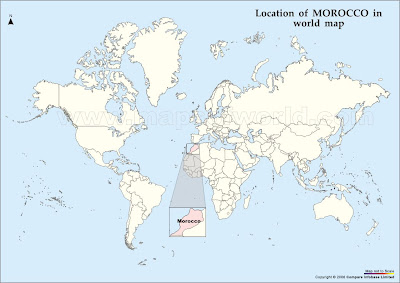
Sometimes when choosing my country challenge winner, I browse thru the cookbooks at the library, which is how I chose this week's country. I found a cookbook called Modern Moroccan, which had the most delicious looking photographs. I have to say, if a cookbook has photos, I'm immediately drawn to it, and this cookbook has gorgeous photos. The cookware is beautiful, the ingredients are so colorful, and the dishes are so elaborate, but simple, with clean, bright flavors and not an abundance of ingredients.
Officially called the Kingdom of Morocco, it is located in Africa's northwest coast. It is the only country in Africa that isn't a member of the African Union, and one of the United States' major non-NATO ally.
Morocco has been inhabited since 8000 BC, originally by the Berbers. Through the Roman Empire and Byzantine Greeks time, the Berbers were able to maintain control over most of modern Morocco. In the medieval times, Islamic expansion made it's way into Morocco.
During the American Revolution, Moroccan rulers were the first to recognize America as a nation, and allowed the ships free and safe passage in their waters. The American-Moroccan Treaty of Friendship stands as the US's oldest non-broken friendship treaty.
 In the 1800's, Morocco became an interest to European countries. In 1906, Spain and France policed Morocco jointly. Tension increased over the years, and the Treaty of Fez was signed, which made Morocco a protectorate of France.
In the 1800's, Morocco became an interest to European countries. In 1906, Spain and France policed Morocco jointly. Tension increased over the years, and the Treaty of Fez was signed, which made Morocco a protectorate of France.Nationalist parties arose, however, and conflicts developed between France and Moroccans as they wanted independence. After France exiled Sultan Mohammed V, Moroccans attacked the French until Mohammed was allowed back into leadership. The revolution was called "Taourat al-malik wa shaab" - the revolution of the King and the People- is celebrated every August 20.
In 2006, Morocco celebrated it's 50th year of independence.

Currently, maps of Morocco differ. The Western Sahara region is currently under dispute.
As for the cuisine, it is very diverse because of many influences, including Berber, Spanish, Portuguese, Turkish, Arab, and Jewish.
Spices are used extensively, and many popular ingredients are mint, olives, oranges, lemons, chicken, and cous cous.
Tagine cooking is very popular, and one of the most common national dishes is Harira.





2 comments:
Ooo!! Are you gonna cook a tagine recipe?? We got a tagine for a wedding gift and have never used it because I just don't know how to.
I really love your country challenge idea - my husband and I have been pretty excited planning some theme nights ourselves!
Post a Comment